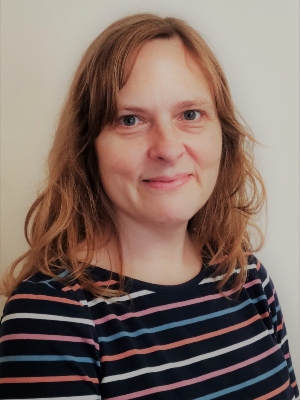Dr Ruth McLauchlan - Radiotherapy Physics
RESEARCH: SUPPORTING CHANGES IN PRACTICE FOR DELIVERY OF RADIOTHERAPY TREATMENTS
 How did you get into research?
How did you get into research?
I did an undergraduate summer research project whilst working in a clinical nuclear medicine department, which resulted in my first conference abstract and publication in a peer reviewed journal. I was accepted onto the Scottish Medical Physics and Engineering training scheme and I continued research in nuclear medicine, but my MSc project ignited my interest in radiobiology applied to radiotherapy. Looking for a new challenge, I left the NHS on completion of my initial Clinical Scientist training and completed a full-time PhD in nuclear structure (experimental) physics.
What do you enjoy about research?
I have always had an enquiring mind. I enjoy asking questions, finding the answers and solving problems. Working in a clinical speciality means you work within multi-disciplinary teams and has the added benefit that the research ultimately benefits patients.
What was the most difficult aspect of doing your PhD?
I left my clinical career to do a full-time PhD in an academic department where my research did not have a direct link to healthcare. I had to take a 50% pay-cut to do this but it was worth it to be able to focus 100% on my project. However, I missed the multi-disciplinary nature of clinical work and the link to patients, so decided that I did not want to stay in a wholly academic career.
What was the most challenging aspect of continuing your research after completing your PhD?
Balancing clinical work and research. My first job after my PhD was in a department that was very short-staffed and the clinical workload had to come first. As a relatively junior member of staff and the only person in my team with a PhD, it was difficult to drive things forward. After having my two children I moved to part-time working which increased the time available to work at home but it meant that I used unpaid time to make progress. I took opportunities wherever I could and fitted them into my time as best I could.
What difference has your research training and experience made to your career?
I returned to the NHS following my PhD with much more confidence in my own abilities and less hesitant to question practices. Over the years, there have been lots of technological changes in radiotherapy physics and I have been able to apply my research training by working in multi-disciplinary teams leading improvements, ensuring we have effective processes to implement changes in practice safely and for the benefit of our patients. I also support others with their research, ensuring robust practices are embedded within our department.
What do you think is the greatest misconception about clinical academia?
That you have to be a genius to be an academic. The Institute of Physics are running a campaign ‘Bin the Boffin’ as the term has been found to put young people off physics and the same could be said for academia in general. Researchers come from many diverse backgrounds. I am an NHS Ambassador for Inspiring the Futures and a STEM ambassador, so I take part in outreach events to show school children the many wonderful careers and opportunities out there.
How has research changed your clinical practice?
It has given me more confidence to embrace and lead change in practice so we can offer and deliver the best treatment for patients.
What has made a difference to progressing your research career?
My amazing MSc and PhD supervisors encouraged and inspired me to never stop asking questions. Throughout my career I have had incredibly supportive managers and colleagues who have trusted me to take on projects and allowed me to explore opportunities, to build networks and develop collaborations. Finally, none of this could be possible without my supportive husband and children who understand when I want to work a bit late or at weekends.
Where do you see your clinical academic career going over the next 5 years?
I’d like to see a clearer career structure for those in non-medical roles who don’t want to be 100% academics and more support for those who want to do all of this while working part-time. Great progress has been made in expanding the involvement of our team in research and development and I hope that continues. I’d like to see my Visiting professorship associated with a better defined and established role, including having students enrolled on full PhD programmes.
Professor Ruth McLauchlan, Consultant Radiotherapy Physicist, Imperial College Healthcare NHS Trust, and Visiting Professor, Imperial College London ruth.mclauchlan@nhs.net
To download Ruth's case study please click here: Ruth McLauchlan - Case Study (PDF)


